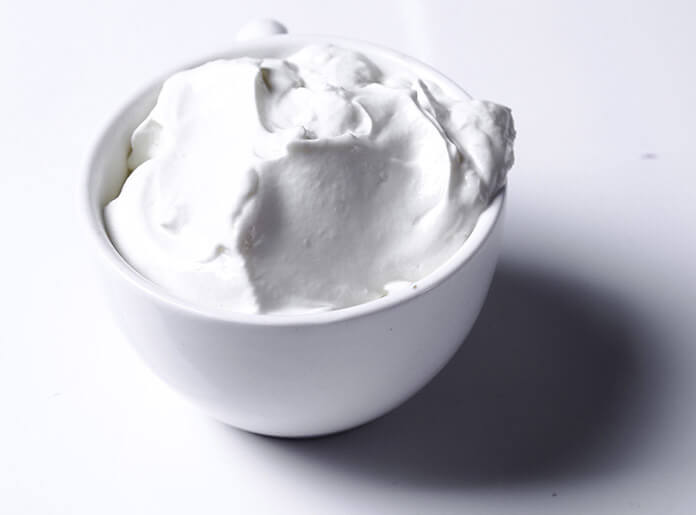

Dogs Can Eat Greek Yogurt
In general, Greek yogurt is a perfectly safe, nutritious addition to your pooch’s diet! Greek Yogurt contains probiotic cultures – these are good bacteria that help promote a healthy gut.
According to Dr. Rachel Barrack, dairy products are not toxic to dogs – however, they are also not necessary and you should switch dog's food gradually.
So, if yogurt and other dairy products disagree with your dog’s digestive system or showing signs of lactose intolerance, stop offering them – a well-balanced dog diet provides all the calcium requirements anyway.
Additional point: Although this article is covering greek yogurt, you may also be asking, can dogs eat yogurt (in general)? This is also perfectly fine. Just make sure your dog isn't lactose intolerant with the checklist below.
Common symptoms of lactose intolerance in dogs:
- Frequent “potty disasters” in the house, even in well-trained dogs
- Bloating
- Signs of abdominal pain
- Diarrhea, which may lead to dehydration and increased thirst
- Vomiting
- Overall weakness
There are other signs, too – and it’s always best to consult your vet if your dog experiences negative symptoms or behaves unusually. Better safe than sorry!
Can Dogs Eat Greek Yogurt for Diarrhoea?
Yes! Unless lactose intolerance is the cause – the American Kennel Club lists yogurt as one of the tried-and-true cupboard cures for diarrhoea in dogs.
The reason is simple: yogurt contains beneficial bacteria, helping restore the gut microflora and providing relief.
However, don’t rush to your pup with a cup of yogurt right after noticing the symptoms.
First, you want to determine the likely cause of diarrhea, which may require a prompt vet visit if you’re not sure what’s happening.
Second, in most cases, you will need to withhold food from your pup (while providing small amounts of water frequently) for 12 hours to a day to allow the digestive system to settle.
If yogurt doesn’t bring relief, try another cure like Pedialyte for Dogs– or better still, book a vet appointment.
If your dog requires probiotics but can’t quite hold anything down, your vet will likely recommend specific canine probiotics instead of plain Greek yogurt.
Always follow your vet’s advice to keep your pooch healthy and happy.
Can Dogs have Greek Yogurt with Honey?


Source: spicygreenginger, CC-BY, via flickr
Most dogs enjoy the taste of raw honey – and according to the Honeybee Conservancy, small amounts of local honey can help clear your pup’s allergies, so go ahead and add a little bit to the yogurt.
Not too much, however! Anything over than a teaspoon daily can trigger adverse effects such as tooth decay and obesity.
Remember: dogs are carnivores, and their teeth and digestive system are best suited for meat, not sweets.
Which is Better: Plain Greek Yogurt or Plain Yogurt?
For dogs that tolerate dairy well, any kind of plain yogurt is a suitable choice.
However, if you were to pick one, Greek yogurt stands out due to the straining process used in manufacturing.
As a result, more whey and lactose are removed, and the protein is more concentrated.
The down math? Double the protein, lower levels of lactose, half the sugar, and much less salt compared to regular yogurt!
How Much Greek Yogurt Can My Dog Eat?
Even if your dog tolerates dairy reasonably well, it’s not the best idea to let them go all out. Depending on your dog's size and weight, limit a serve of Greek yogurt to 1-2 tablespoon to stay on the safe side.
The 10 Percent Rule: Yogurt is considered as a treat. It is recommended that yogurt should be no more than 10 percent of the calories your dog consumes each day.
Can I Give My Dog Greek Yogurt Every Day?
There is nothing wrong with giving your dog a little bit of Greek yogurt every day!
Simply stick to the amounts specified above, meaning your dog can safely enjoy 1-2 tablespoon of Greek yogurt daily.
The amount can be increased slightly if your dog is taking antibiotics – but only following your vet’s explicit approval.
This is because your pup may benefit from extra probiotics following a harsh antibiotic treatment.
How Do I Choose Yogurt For My Dog?


There are a few things to look out for when choosing the best yogurt for your canine friend:
1. Unsweetened Plain Yogurt
Read the ingredient list carefully and steer clear of any sweeteners and flavors.
Your dog doesn’t need excess sugar – plain Greek yogurt is just the ticket. It’s not just about tooth decay and obesity: certain sweeteners are downright toxic for dogs.
A gruesome example is xylitol, which can cause dangerous side effects such as seizures, low blood pressure, and even death.
Some other sweeteners that disagree with dogs are stevia, sucralose, and aspartame. However, it’s not a full list, and as stated above, always pick plain yogurt to avoid problems.
2. Contains Live and Active Cultures
Check for the label “contains live and active cultures” as it means the product is full of live active bacteria, beneficial for gut health.
If you are going to give your pooch yogurt, might as well make sure it’s full of probiotic goodness to boost immunity and maintain healthy digestive balance!
3. Nonfat and Low-fat Yogurt
Excess fat is bad for dogs, leading to numerous health issues from obesity to pancreatitis. This is why you should aim for low fat or even fat-free varieties of Greek yogurt. All of the protein, minimal fat – winning combination for your dog!
How Do I Serve Greek Yogurt To My Dog?


Offering Greek yogurt to your dog can be so much fun, adding variety to your pup’s diet and creating new bonding opportunities! Try the following suggestions:
- Making yourself a morning smoothie with plain Greek yogurt? Don’t be greedy and share a few licks of yogurt with your pup (not the smoothie though – that’s a bit too much).
- Top your dog’s meal with a little bit of plain Greek yogurt. Anything from mince to formulated dog food goes well with yogurt if your dog likes it!
- Alternatively, you can even mix some Greek yogurt into homemade dog meals to add texture and spice up the flavor. However, make sure that there isn’t too much yogurt in every serve, as daily guidelines stated above still apply!
- Hot day? Treat your pup to a cube of frozen plain Greek yogurt. You can also make a yummy fruity frozen Greek yogurts mixed with some blueberries, strawberries or blackberries. It’s a great, enjoyable treat that also doubles up as entertainment.
Conclusion
In conclusion, if your pup tolerates dairy well and loves yogurt – go for it and share some with them!
Avoid sweetened, flavored varieties and always consult your vet if unsure – otherwise, nothing stopping you from offering your dog a couple of teaspoons of plain Greek yogurt with reduced fat content.
In addition, you may be interested to read the following posts:



















